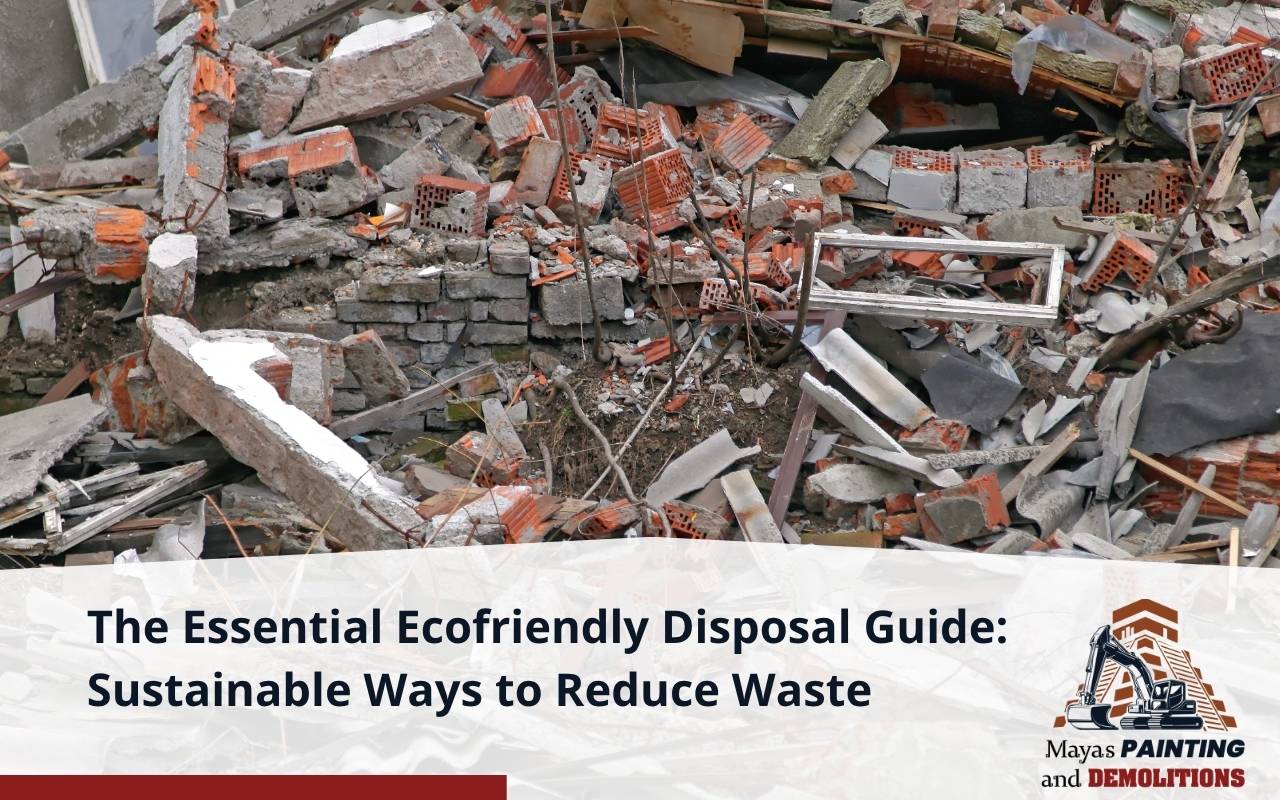
Every year, millions of tons of waste end up in landfills, overwhelming our planet and ecosystems. Traditional waste disposal is not sustainable, and without change, consequences are dire. This eco-friendly disposal guide provides strategies to reduce your footprint responsibly.
Eco-friendly living is more than recycling bottles. It means adopting habits where sustainability guides every decision. From composting to upcycling, every small change matters. If you want professional support, check how to remove construction debris.
Understanding Eco-Friendly Disposal
Eco-friendly disposal includes reducing, reusing, and recycling to minimize harm. Items are viewed as opportunities for recovery. This eco-friendly disposal guide shows how waste can become a resource for new products or energy.
By reducing consumption, reusing items, and recycling properly, we lower greenhouse emissions and preserve biodiversity. Following these steps ensures resources remain in circulation, avoiding landfill overuse.
Importance of Sustainable Waste Reduction
Waste reduction helps protect future generations. Overflowing landfills and methane emissions highlight the urgency. Adopting a sustainable lifestyle limits these risks while saving money.
- Choose reusable over disposable items.
- Support take-back programs and refill stations.
- Reduce over-packaging at the point of purchase.
Businesses and municipalities that adopt these practices cut costs while improving efficiency. Learn more by visiting construction waste disposal.
The Impact of Traditional Waste Disposal Methods
Traditional landfilling and incineration damage health and the environment. Landfills emit methane and risk groundwater contamination. Incinerators release harmful pollutants into the air. This eco-friendly disposal guide highlights the need for better alternatives.
- Recycling reduces landfill reliance.
- Composting cuts methane emissions.
- Upcycling fosters creativity and sustainability.
Embracing a Sustainable Lifestyle
Living sustainably requires awareness of product impact and disposal routes. Consumers must choose biodegradable, ethical goods that reduce waste. Communities can expand these efforts with initiatives like tool libraries, swaps, and local recycling hubs. For hauling needs, see debris hauling services.
Practical Steps Towards Eco-Friendly Disposal
Simple actions at home reduce waste. This eco-friendly disposal guide recommends a waste audit to identify major sources. Steps include:
- Separate bins for recycling and compost.
- Reusable shopping bags and wraps.
- Durable products that last longer.
Each step encourages sustainable routines and long-term responsibility.
Benefits of Composting in Waste Reduction
Composting transforms organic waste into soil nutrients. Unlike landfill decomposition, composting reduces methane. It also enriches soil, saves water, and lessens fertilizer needs. Both home and community systems make composting widely accessible.
Upcycling: Turning Trash into Treasure
Upcycling redefines waste as opportunity. Glass jars, pallets, and textiles become useful items again. This eco-friendly disposal guide encourages creativity that reduces demand for virgin resources. Communities host workshops, markets, and online exchanges supporting upcycling practices.
Choosing Products with Minimal Packaging
Packaging accounts for large waste volumes. Opt for recyclable, compostable, or minimal packaging whenever possible. Conscious shopping reduces environmental impact. Supporting brands that reduce packaging promotes industry-wide change.
For disposal planning, visit debris disposal cost.
Community Engagement in Waste Management
Waste management requires collective action. Governments, businesses, and communities collaborate through recycling programs, cleanups, and education. Schools and workplaces also contribute by encouraging sustainable practices. These efforts strengthen networks and make waste reduction part of daily culture.
FAQs
What is an eco-friendly disposal guide?
It is a structured plan that explains sustainable ways to reduce, reuse, and recycle while protecting the environment.
How does composting help waste reduction?
Composting diverts organic waste from landfills, reduces methane emissions, and creates nutrient-rich soil for gardens.
Why should I upcycle materials?
Upcycling extends product life, reduces waste, and fosters creativity by turning discarded items into useful goods.
What are easy first steps toward eco-friendly disposal?
Start with a home waste audit, separate bins, and reusable items to reduce daily waste output effectively.
Can businesses benefit from waste reduction?
Yes, businesses save money, improve efficiency, and enhance reputation by adopting eco-friendly waste reduction practices.
Shifting Towards a Greener Future
Transitioning to sustainable disposal requires creativity and cooperation. This eco-friendly disposal guide encourages collective commitment to a cleaner planet. For tailored solutions, reach out on our contact page.
